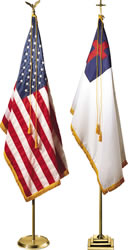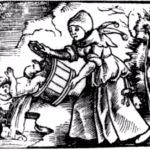Redeeming Culture In Stories and Politics
What? Author Fred Warren won’t be able to post, and on today of all days?
I simply can’t imagine what I would write about to fill the vacancy.
This is a followup to last month’s now-complete Speculative Politics series. Stop me if you haven’t heard this one. Instead, drop my column and link over there, time permitting, and survey two great authors — Kerry “The DarkTrench Saga” Nietz and Marc “König’s Fire” Schooley — as they explore politics in fiction and reality. Only then return.
In short, Kerry and Marc share the same view on politics in speculative stories: story comes first. Having read their novels, I can confirm this isn’t just theory for them. (And by “story” I don’t mean a notion of “story” apart from Biblical beauty and truth. They do that very well.)
Yet they clashed mightily, yet civilly, on the issue of politics in reality.
I’m unsettled by some of what Marc has written. He seems to have taken the backdrop of human history, found the terrible spots that might be in some way be attributed to the Christian church, or Christians, and used them as justification — I guess — as to why individual Christians shouldn’t vote. In America!
I’m sorry; I just can’t find the logic in that.
If a Christian lends her voice and support to a candidate and a political party, she is complicit in their platform and actions once elected, has attached the name of Christ to their actions, and is complicit in any unintended consequences.
[…] Given this, it’s easy to see how we’re culpable — somewhat — for our vote, and how we may drag the name of Christ through the political mud.
These become tough issues, very likely for this central reason: if you have previously been exposed to people who abuse politics one way or the other.
- If you are from a liberal/“secular” background in which imposter Christianity was a means to revisionist families, “social justice,” and imaginary future progressive utopias, you may lean toward Biblical Christians being involved in political causes.
- If you are from a “conservative” background, in which Christianity(?) was seen as a means to flag-waving Family Values and Taking Our Country Back, you may do the reverse — seeing only bad results from Christians’ involvement in culture.

Which flag should fly higher?
In brief, here’s my story: I grew up in a default Christian conservative household, yet not one where politics was over-emphasized. Voting and so on were duties, but not something to obsess over. Only in the mid- to late-‘90s did I get involved more, to the point of writing (I am not entirely ashamed of this) snarky-style student columns for my campus’s student newspaper. Since then my presuppositions of politics have changed: they are means to His end, and that end is not Family Values, man-made future “utopias,” or Christian-Nation-Ism.
Naturally I found the series fascinating, and yesterday I was finally able to offer a comment. Here it is again, with only a few edits. It consists mostly of questions based on this premise:
Our beliefs about Christians, stories, and culture-redemption should be consistent with our beliefs on real-world politics.
I had thought to write on this only after Tuesday, when all jets are much cooler.
However, that also brings the risk that the topic will have cooled just as much.
So here goes, though I’m sure it won’t be the “final word,” at least not from me!
First a few statements, and then a series of exclusive Political Challenge Questions.
 Marc Schooley and Kerry Nietz are two of my favorite authors. I’m biased. I’m also right in the middle of Freeheads, the conclusion to Nietz’s DarkTrench Saga series, and will likely be able to recommend that as easily as I have his previous novels, and Schooley’s award-winning König’s Fire.
Marc Schooley and Kerry Nietz are two of my favorite authors. I’m biased. I’m also right in the middle of Freeheads, the conclusion to Nietz’s DarkTrench Saga series, and will likely be able to recommend that as easily as I have his previous novels, and Schooley’s award-winning König’s Fire.- It’s been a delight to help organize this Speculative Politics series and see the response.
- Schooley’s novels should be read by anyone who loves truthful and beautiful storytelling with Biblical depth-delving. I speak specifically to his critics. In particular, König’s Fire explores the response of the individual, caught in a corrupt system, to align with the groaning creation and do whatever he can to save lives. You will not look at Romans 8 the same way again.
 Partway through Nietz’s third novel, I reached his first subtle reference to American patriotism. He’s a class-act author, not a clichéd jingoist flag-waver. (Not that anyone has said this.) As I wrote in my review of A Star Curiously Singing, I had hoped his sci-fi series set in an Islam-ruled society would not turn out to be one long, subtlety-lacking diatribe against Sharia law and compromise on anti-terrorism foreign policy. Reading the actual series, you don’t even get that hint. Nietz is telling a story first, just as he said that he wants to do (in part 1).
Partway through Nietz’s third novel, I reached his first subtle reference to American patriotism. He’s a class-act author, not a clichéd jingoist flag-waver. (Not that anyone has said this.) As I wrote in my review of A Star Curiously Singing, I had hoped his sci-fi series set in an Islam-ruled society would not turn out to be one long, subtlety-lacking diatribe against Sharia law and compromise on anti-terrorism foreign policy. Reading the actual series, you don’t even get that hint. Nietz is telling a story first, just as he said that he wants to do (in part 1).- It looks like both authors are trying to stick to Scripture as they engage with culture, both in storytelling or in political involvement (or purported non-involvement). That’s admirable. It’s also challenging to those of us who may instinctively prefer — we all struggle with this — sound-bite arguments!
So that being said, I do have some questions, mostly rhetorical and mostly for Marc.
Bear in mind, when I say “redeem” I am not speaking of a final victory here on Earth, apart from the Kingdom and apart from Christ. I speak of actions that assume He has already won and that His victory is in a sense actualized and reflected in our actions that exalt Him.
Speculative Politics: Challenge Questions
- Isn’t politics merely the governance of culture?
- If so, even without explicit Scriptural endorsement of a secular government being used by God (Rom. 13), shouldn’t Christians look at politics/government in much the same way we react to the rest of culture — art, storytelling, music, movies, and more?
- Contrary to abusus non tollit usum (roughly, the abuse of a Thing does not negate rightful use) — does the misuse of politics alone negate rightful use?
- If so, why apply this only to politics, and not money, sex, sports, Harry Potter, etc.?
- As many have already said, isn’t politics unavoidable in life — regardless of parties, positions, national platforms, and presidential polemics?
 Won’t redeemed “politics” play a role in the New Heavens and New Earth, where Scripture explicitly says kings (implying human bureaucracies!) will bring their glories into New Jerusalem (Rev. 21)? If so, why shun even attempts to “redeem” politics here?
Won’t redeemed “politics” play a role in the New Heavens and New Earth, where Scripture explicitly says kings (implying human bureaucracies!) will bring their glories into New Jerusalem (Rev. 21)? If so, why shun even attempts to “redeem” politics here?- While many Christians have absolutely moralized and treated politics and American identity (Christian-Nation-ism, etc.) like a false religion, why act as if not-voting, rather than more love and truth based on the Gospel, is the solution?
- Won’t more Gospel in politics, rather than less, help redeem government?
- Shouldn’t the Church act like the “Christian nation” that it is? And shouldn’t this good “nation” have borders necessarily only for its own protection, and not be a nation that closes itself off and refuses to work among and with secular nations — even while supporting its (the Church’s) home citizenry and maintaining its inner integrity?
- If that proves difficult (and vocational boundaries can be fuzzy!), isn’t it true that a Christian’s individual calling — his role as parent, businessperson, engineer, artist, voter, council member — is distinct from the Church’s role?
- Derivative from that: does the Christian individual often do things the Church doesn’t do as a collective present “outpost” of the future/present Kingdom/nation?
- If that’s true, why should these callings necessarily exclude voting?
- Much has been made of the difference between the Roman empire of Paul’s day and today’s representative republic, yet what does this nation’s impersonal “emperor” — that is its highest law, the Constitution — ask of citizens? Does it assume (even if does not mandate) an active, intelligent, involved, voting citizenry?
- Do not even our human leaders — those whom we are expected to follow, if they do not contradict God’s Word — encourage political engagement and voting, as they should? If they do encourage this, why should we in this area disobey them?
- Is our motive for disengagement from politics based on distaste for its abuses — that is, a reaction — or proactive love for neighbor based on the Gospel of Jesus Christ?
- Do we fear coming off as moralizing “take our country back” jingoists more than we fear the worse consequences of Biblical Christians not being involved in our culture and its governance? If so, why base our decisions on fear or dislike of The Bad Guys? (Isn’t that what we would say those previous “government can save you” evangelicals have done?)
- Wouldn’t it be better to take a risk in praying for leaders, studying leaders, opposing or supporting leaders, changing views if necessary — while ensuring we do our best to separate our Kingdom “citizen” callings from our American citizen callings? Can we not trust in God as we seek to obey Him, to help us keep “it’s better of this nation does this” and “you can’t follow the Law; only Jesus saves” responses distinct for nonbelievers?
- With a few word changes, I will quote from commentator Austin Gunderson in part 4:: “To paraphrase James: [Biblical cultural engagement and efforts to save lives and promote Godly government] apart from voting is dead. Show me your opinion apart from your vote, and I’ll show you my opinion by my vote.”
‘All hail the Counter-Culture (whatever it is)’?
Semi-finally, I believe Christians struggling with questions of culture need to quit basing their beliefs solely on reactions to cultures they’ve already known.
From writers’ conference cosplay controversies to church “worship wars,” it seems whole generations have grown up believing the axiom that a counter-culture is the best culture, no matter what the (often merely perceived) “dominant culture” is. Thus we get beliefs like:
- Because Perceived Majority Culture (PMC) liked organs, we like guitars.
- Because PMC liked prairie romance, we like Bizarre Speculative Fiction.
- Because PMC was too involved in politics, we’ll stay the blazes out of it.
- Because PMC wasn’t involved in politics, we’ll jump into politics headfirst.
- Because PMC sent us to public school, we’ll homeschool.
- Because PMC believes in girls wearing pants, we’ll be sure to dress them in nothing but denim skirts the rest of their days — we’ll be a “peculiar people,” as in 1 Peter 2:9 (KJV).
- Because PMC lives on the grid, we’ll buy generators for our remote mountain cabins.
- Because PMC hates the Bible, we’ll love it.
All of that is based not as much on proactive honoring of God, but as reactions to perceived Bad Guys. All throughout it’s not God, but The Counterculture that must be honored at all costs. Later, that “counter-culture” becomes majority culture. Then it all starts over again.
Maybe this is over-idealistic, but I don’t get it.
The Church, herald of the present/future Kingdom regardless of whether the world knows this truth, is the world’s default Culture. The Church announces that God has already begun to redeem culture, the physical world, and points to the future when that is fully realized. It doesn’t merely try to wrest culture from Satan’s control; it condemns evil perversions as alien and points to what in culture happens to echo God’s Word (our only sure revelation).
So the Church is not anti-culture or pro-culture. Rather, it should aggressively, graciously proclaim the Biblical Story. It also proclaims what in culture opposes that Story and what may echo the Story (thanks not to man’s goodness but to God’s common grace).
This applies to stories, speculative and otherwise — part of the art of culture.
And this applies to politics, the governance of culture.
You can’t condemn one aspect as “irredeemable” without dragging the other into it.
This is also why the Amish, who have many anti-Biblical beliefs, at least have consistent “counter-culture” beliefs. They consistently oppose culture for reasons that ultimately come down to this claim: because counter-culture. (Even while benefiting from culture.)
Someone who says and moreover practices this belief: “Christians should aggressively, with Gospel love and intent, storm into storytelling and be the best and most Biblical and beautiful at this craft, because God and not man/the devil owns great stories,” but also says, “we should avoid doing this exact same thing with politics,” seems to me inconsistent.
Politics/storytelling are merely sides of the same perennial challenge: how should the Christian nation, the Church, and its “citizens” engage with the world’s cultures?

Final notes on votes
I think I managed to condense this:
American voters: Don’t be distracted by pop-culture, media-driven questions over style, gaffe meters, sound bites, life stories, personal “likeability,” debate performance, potential for promise-keeping, relationships with previous leaders, wealth, or even religious faith.
The only question to ask about any potentially electable presidential candidate is this: Which leader is more likely to do more “to the best of [his] ability [to] preserve, protect, and defend the Constitution of the United States” (the actual oath the president swears to uphold under that higher authority, the Constitution)?











































“All that is necessary for the triumph of evil is that good men do nothing.”
Stephen, a well thought-out post. You made clear arguments and raised good questions. I wish I’d had time to be a part of the politics discussion. I think it’s such an important point for Christians, and as you can tell from my closing statement yesterday, I’m on the side of Christians having the responsibility to vote. We are stewards of this world. I don’t see anywhere that God lifted the mandate He gave to Adam. Why, then, would we shrink from the responsibility to exercise political power, small though it may be? The idea that it might go wrong and we, therefore, bear the blame, is no more true than the one I posted on my own blog yesterday: “Crooked politicians are elected by people who don’t vote.”
Becky
Thanks, Becky, and now I wish I had also said this part!
The Gospel and the Great Commission do not, contrary to some perceptions, replace the original Creation Commission of Gen. 1-2. The Great Commission only modifies the Creation Commission. We tend the Earth, “subcreating,” establishing order and ruling, just as Adam did — while also recognizing that sin is our greatest setback and Christ the only answer.
I am very excited about the end of this election–not because of the results, but because it means a respite from ads. If I could change one thing about politics, I’d get rid of the barnyard brawling–in the only snippet of debate I saw, both candidates were talking over each other like four-year-olds–and make both of them sit down and rationally discuss their own plans before allowing them to criticism the other’s…
Unrealistic? Of course. Impossible? Probably. In the meantime, let’s focus on making sure OUR behavior as voters (or non-votes) is respectable and mature.
I seem to be in the minority here, Galadriel. I am glad for campaign ads, negative or otherwise. It’s much better than the alternative, and while I can understand natural frustration, I much prefer campaign ads to “heil”-themed propaganda signs of a single Dear Leader dotting the landscape. A society must have one or the other.
Voters must also choose whether they want sound-bite, timid, fearful-of-speaking-openly candidates versus rancorous and combative ones. It’s one or the other!
Besides, this is nothing compared to the 1800 election in which Thomas Jefferson called John Adams a “hideous hermaphrodite character”. Not to mention the Grover Cleveland “Ma! Ma! Where’s my pa!” accusation. (To be fair, the candidate’s name was “Grover,” and the Constitution should forbid presidents being named such.)
Things are much tamer now. Often I suspect it’s mainly the media, who have their own reasons to decry “negative campaigning” (they don’t like the competition?), who promote the complaints about negative campaigning.
Myself, I complain more about campaigns against negative campaigning more than the negative campaigning.
But I still throw away those ridiculously prevalent mailed political postcards that accuse opponents of, at minimum, goat molestation and child sacrifice. 🙂
Maybe I’ll forward all my political flyers, postcards, phonecalls, etc, to you then. With five elections in my home state this year, there’s plenty of material 😀
Political advertisements are relatively sparse in my area, probably because my state is not at all a swing state. I see many more lawn signs and billboards for local elections and specific referendums than for national or even state-wide concerns. I should probably be grateful for missing out on a good deal of the hype. I even prefer the focus on local politics, because those are the things that immediately matter, and the people involved are real and present.
Still, I do sometimes lament the fact that my vote is of no real consequence for presidential elections, and even of little consequence for state Congressional elections.
I was getting Obama and Romney ads on Youtube, and it’s hard to escape it in Connecticut. They even were standing on the sidewalk with signs in busy intersections. Plus, we had some pretty harsh attack ads here with the Linda McMahon thing, culminating in her saying it was okay to vote for Obama and her. A very wince-inducing moment for anyone who would have supported her.